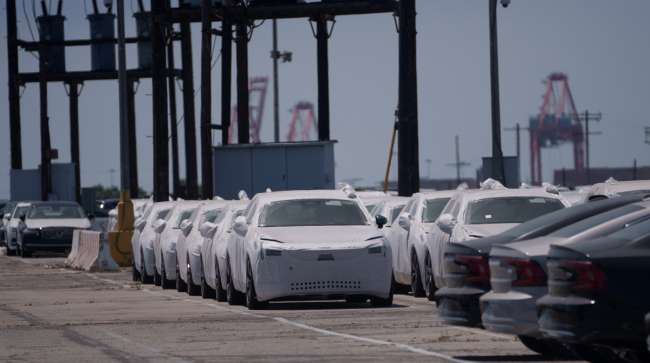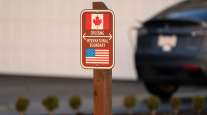Trump’s Latest Trade Move: Tariffs on Imported Cars

[Stay on top of transportation news: Get TTNews in your inbox.]
President Donald Trump said he would unveil new tariffs on automobiles, adding to his wave of sweeping import levies as he seeks to remake global trade relationships and pressure companies to move production to the U.S.
“We are going to do that on, around April 2,” Trump told reporters Feb. 14 in the Oval Office, as he signed executive actions on energy policy.
The move is the latest in a rapidly widening trade war as Trump delivers on his campaign pledges to institute sweeping tariffs on U.S. allies and rivals alike. It comes a day after Trump unveiled his most expansive measure yet, ordering his administration to consider imposing reciprocal tariffs on numerous trading partners, an effort to address what he says is a system that is tilted against the U.S.
The reciprocal levies on nations that have import taxes on U.S. goods could come as soon as April. Those levies are distinct from the sectoral ones Trump promised on autos and has threatened against other industries, including energy, semiconductors and pharmaceuticals. Earlier this week, he also announced plans to slap 25% duties on steel and aluminum imports.
Host Seth Clevenger and TT's Connor Wolf discuss CES 2025 and the emerging technologies that could push the trucking industry forward. Tune in above or by going to RoadSigns.ttnews.com.
The auto threat offers to put some of the biggest brands in Japan, Germany and South Korea in Trump’s crosshairs. Imports accounted for roughly half of the U.S. auto market last year. About 80% of Volkswagen AG’s U.S. sales are imported, while 65% of Hyundai-Kia’s U.S. sales are imported, according to figures from Global Data, a market researcher.
Trump on Feb. 14 did not provide any details on the scope or rate of the potential auto levies. It is also unclear the impact they would have on vehicles built under the free trade agreement between the U.S., Canada and Mexico. Auto production supply chains across North America are highly integrated.
The U.S. neighbors, both major trading partners, are already facing a threatened 25% tariff on imports that Trump announced — and then paused until March — in a bid to extract concessions from Mexico and Canada over border security, one of his top priorities.
Trump has used tariffs to extract policy concessions from other nations on immigration and the flow of illegal drugs. And he has highlighted tariffs as a tool that he says will convince companies to move production to the U.S.
On the campaign trail, he mused that he wanted German car companies to become American corporations, a lofty goal that is unlikely to come to fruition because of trade barriers.
Want more news? Listen to today's daily briefing below or go here for more info:





